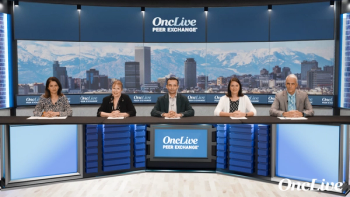Experts Perspectives: Navigating Newly Diagnosed MM to Early Relapse

EP. 1: Transplant Eligible, Newly Diagnosed Multiple Myeloma: PERSEUS & CASSIOPEIA Study Updates
ByAjay Chari, MD,Noopur S. Raje, MD,Adriana Rossi, MD, Weill Cornell Medical College,Natalie Callander, MD,Tom Martin, MD Panelists discuss the findings of the PERSEUS trial and the recent cytogenetic risk analysis for patients with newly diagnosed transplant-eligible multiple myeloma. They then explore the CASSIOPEIA trial and its implications regarding daratumumab quadruplet induction regimens.

EP. 2: Quadruplet Induction Regimen in Newly Diagnosed Multiple Myeloma
ByAjay Chari, MD,Noopur S. Raje, MD,Adriana Rossi, MD, Weill Cornell Medical College,Natalie Callander, MD,Tom Martin, MD Panelists discuss whether daratumumab quadruplet induction regimens should be considered the new standard of care for newly diagnosed transplant-eligible patients and explore scenarios in which a triplet induction regimen might still be appropriate. They also review the findings from the ISKIA and GMMG-CONCEPT trials, including considerations for using isatuximab-carfilzomib (IsaKRd) over D-VRd.

EP. 3: Transplant-ineligible Patients with Newly Diagnosed Multiple Myeloma: CEPHEUS, IMROZ, and BENEFIT Studies
ByAjay Chari, MD,Noopur S. Raje, MD,Adriana Rossi, MD, Weill Cornell Medical College,Natalie Callander, MD,Tom Martin, MD Panelists discuss the CEPHEUS trial results for newly diagnosed patients who are not transplant eligible, highlighting key takeaways. They also compare the CEPHEUS data with other quadruplet regimens in the non–transplant-eligible space, such as Isa-VRd.

EP. 4: MRD Negativity as a Trial Outcome and Its Use in Clinical Practice
ByAjay Chari, MD,Noopur S. Raje, MD,Adriana Rossi, MD, Weill Cornell Medical College,Natalie Callander, MD,Tom Martin, MD Panelists discuss the importance of minimal residual disease negativity as a primary outcome measure and the treatment strategies for patients who are eligible for transplantation but choose to decline it, including preferred induction regimens for this population.

EP. 5: Use of CAR T-cell Therapies for Early Relapse Multiple Myeloma
ByAjay Chari, MD,Noopur S. Raje, MD,Adriana Rossi, MD, Weill Cornell Medical College,Natalie Callander, MD,Tom Martin, MD Panelists discuss the currently available chimeric antigen receptor T-cell therapies for early relapse multiple myeloma, examining their place within the treatment paradigm and how factors such as product type (cilta-cel vs ide-cel) and high-risk features (such as minimal residual disease positivity post induction and extramedullary disease) influence clinical decision-making.

EP. 6: Considerations for Triplet or Quadruplet Regimens in Transplant-ineligible Patients with Newly Diagnosed Multiple Myeloma
ByAjay Chari, MD,Noopur S. Raje, MD,Adriana Rossi, MD, Weill Cornell Medical College,Natalie Callander, MD,Tom Martin, MD Panelists discuss the key disease and patient factors considered when choosing between triplet and quadruplet induction regimens for patients with transplant-ineligible multiple myeloma, as well as the unmet needs that persist in the treatment landscape for both transplant-eligible and ineligible populations.

EP. 7: Considerations for Use of CAR T-cell Therapy in Multiple Myeloma
ByAjay Chari, MD,Noopur S. Raje, MD,Adriana Rossi, MD, Weill Cornell Medical College,Natalie Callander, MD,Tom Martin, MD Panelists discuss how patient and disease factors influence the choice between ide-cel and cilta-cel for chimeric antigen receptor (CAR) T-cell therapy, the significance of adverse event profiles in clinical decision-making, the use of bridging therapy prior to infusion, and the experiences of progression rates and potential mechanisms post treatment, as well as future directions for CAR T-cell therapy in relapsed/refractory multiple myeloma.

EP. 8: CAR T-cell Therapies for Multiple Myeloma: KarMMa-3 and CARTITUDE-4 Study Updates at IMS 2024
ByAjay Chari, MD,Noopur S. Raje, MD,Adriana Rossi, MD, Weill Cornell Medical College,Natalie Callander, MD,Tom Martin, MD Panelists discuss how the KARMMA-3 study’s design, patient population, and efficacy outcomes—including overall survival data—inform the approval of ide-cel, as well as the implications of CARTITUDE-4’s recent findings on treatment selection and approaches for cilta-cel in chimeric antigen receptor T-cell therapy.

EP. 9: Insights from IMS 2024 on Counseling Patients with Multiple Myeloma about CAR T-cell Therapy and Connecting to Referral Centers
ByAjay Chari, MD,Noopur S. Raje, MD,Adriana Rossi, MD, Weill Cornell Medical College,Natalie Callander, MD,Tom Martin, MD Panelists discuss how community providers can implement strategies and utilize resources to effectively connect patients to referral centers for chimeric antigen receptor T-cell therapy, while addressing how to initiate conversations about the therapy and counsel patients regarding potential adverse events.

EP. 10: Importance of Early Referral for CAR T-cell Therapy in Multiple Myeloma and Patient Quality of Life
ByAjay Chari, MD,Noopur S. Raje, MD,Adriana Rossi, MD, Weill Cornell Medical College,Natalie Callander, MD,Tom Martin, MD Panelists discuss how early referral for chimeric antigen receptor T-cell therapy is crucial for patients, as it helps to overcome potential barriers and ensures timely access to this transformative treatment option.


